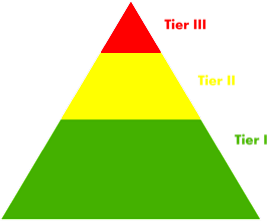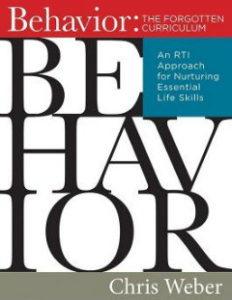An RTI Approach for Nurturing Life Skills
Behavior: The Forgotten Curriculum, An RTI Approach for Nurturing Essential Life Skills
By Chris Weber
(Solution Tree, 2018 – Learn more)

Multi Tier Support Systems (MTSS) for academics have been a part of most elementary and middle schools in the form of Response to Intervention (RTI) for the last half dozen years or more. Similar support systems to help students learn to manage their own behavior have also gained some popularity, mostly in the form of Positive Behavior Intervention Supports (PBIS.)
Chris Weber’s very helpful book, Behavior: The Forgotten Curriculum, An RTI Approach for Nurturing Essential Life Skills, seeks to help schools implement MTSS for behavior in a systematic but practical way, with or without formal adoption of PBIS.

The book is packed with ready-to-use resources in each of its five chapters plus an introduction and multiple appendices. Look below for an overview of information and resources in each.
Introduction

- Self-Regulation – ability to cope with stressors (positive and negative) in a socially acceptable manner.
- Mindsets – students see themselves as capable and lovable.
- Social Skills – students can demonstrate safe and respectful interactions with others.
- Learning Strategies – students have an ownership of their learning and skills to organize and self-regulate for optimal learning.
- Perseverance – students have the ability to put forth continued efforts to reach goals.
- Academic Behaviors – students attend to learning and complete quality work.
Chapter 1: Identifying, Defining, and Making Sense of Behavioral Skills
This chapter focuses on working as a school-team to define and refine Tier 1, which includes school-wide expectations, procedures, rules for behavior, and common vocabulary.
Chapter 2: Modeling, Teaching, and Nurturing Behavior Skills
Building on the previous chapter, the focus here is teaching students the school-wide expectations defined and refined in chapter 1. The author reminds readers that explicit teaching and modeling are needed for students to internalize the expectations, and he shares many teaching ideas. Additionally, there is a discussion about (andd resources for) screening students for possible needs in a Tier 2 behavior intervention.
Chapter 3: Measuring Student Success, Providing Differentiated Supports, and Intervening Appropriately
This chapter offered much needed insight about the notion that differentiated teaching and support of students in Tier 1 of behavior instruction are needed just as they are in academics. The key idea is that differentiation should be offered before referring a student for Tier 2 behavior supports. Resources include strategies for documenting behavior, formative assessment of behavior, and differentiated instruction in the six skills noted in the introduction.
Chapter 4: Preparing for Tiers 2 and 3 Behavioral Supports
Here readers will find tools and strategies for serving students who need Tier 2 and/or 3 behavior supports. There are resources for analyzing unwanted behaviors and identifying areas of need, developing specific goals, designing and implementing intervention plans, and monitoring progress.
Chapter 5: Navigating the Predictable Challenges and Considerations for Implementation
This last chapter helps educators anticipate, proactively ward off, and problem-solve for typical implementation problems in schoolwide MTSS for behavior. Building and sustaining staff buy-in, garnering administrator support, and working with parents are all explored.
Appendices
Here you’ll find resources, resources, resources. For example, the book offers simple blackline masters for analyzing student behavior and developing behavior support plans.
Chris Weber’s book is good resource, and I recommend it for any school that is ready to develop an MTSS in behavior.
______________________________________
Rita Platt (@ritaplatt) is a National Board Certified Teacher with master’s degrees in reading, library, and leadership. Her experience includes teaching learners in remote Alaskan villages, inner cities, and rural communities. She currently is a school principal, teaches graduate courses for the Professional Development Institute and blogs at Heart of the School for MiddleWeb.


































